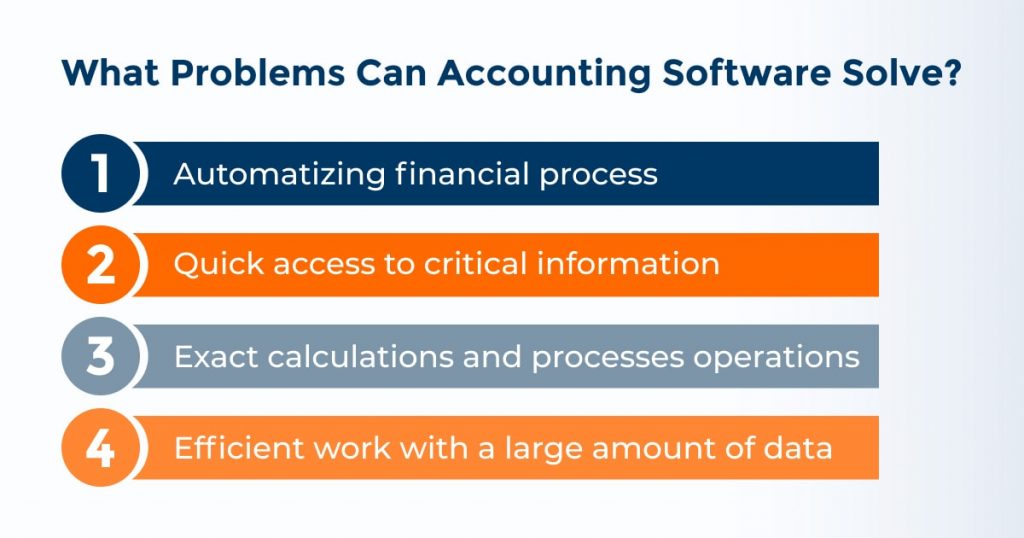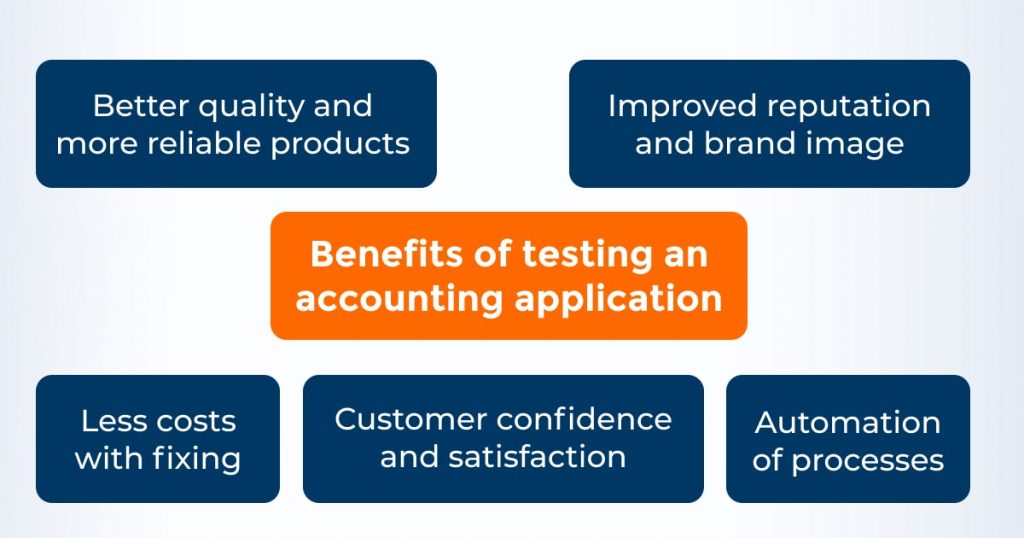What are the dangers of mistakes in accounting software?
by Yanina Shabanova | May 11, 2022 10:05 am
Accounting software is a crucial element of day-to-day business operations. The development of such products is rather complex, and it takes hundreds of hours to create high-quality software. But with a wise strategy, the final product will be competitive and advantageous in the market.
This article will look at how to ensure the reliability of accounting software, user loyalty, and business success via testing.
What are the challenges in developing accounting software for a small business?
Accounting software is a tool for tracking sales, profits, cash flow, cash reserves, loan allocations, and billing information. For many small businesses, that may be sufficient as the smaller the company, the more intimate knowledge the owner has of its finances. Other types of accounting software can produce balance sheets, and with a balance sheet, the value of creditors, debtors, bank balances, and assets. In larger organizations, the financial accounts will be more sophisticated and produce an analysis of all principal areas of the business.

Despite the popularity and demand for such services, quite a bit of specialists have expertise in working with these types of projects. Profound expertise is required not only in software development but also in understanding accounting processes in order to create compelling software.
Accounting applications for small businesses can perform a particular set of functions and solve all necessary types of tasks. However, even a small calculation error can cause serious harm to the business, and the developer company can lose a client and damage its reputation.
What failures of accounting software can lead to business risks?
Applications for accounting operations can have different specifics and functionality. However, neglecting the testing phase in the development of any software can lead to business risks[1] or even loss of profit. What are the most common mistakes developers of accounting applications face?
- Mistaken reporting of income and expenses
Errors in accounting for financial transactions can distort the company’s estimated operating profit margin and result in inflated earnings or tax overpayments.
- Incorrect customer data monitoring
If the client’s data or interaction is displayed incorrectly, accountants can mistake tracking cash flow and cause financial damage to the company.
- Errors in financial statements
The automatic creation of monthly, quarterly, and annual reports is essential for accountants’ work. If the software produces incorrect reports or ignores them, the company’s team may miss important information.
- Difficulties with access levels
A flexible system of access levels delegates various rights to software users. It provides the necessary functionality for employees and ensures data privacy protection. When the wrong person gets full access to the app, this can lead to overreach or data leakage.
- Problems of integration with other systems
Accounting software needs to be integrated with third-party solutions and systems, such as online banking, electronic document management systems, etc. If applications cannot connect to, download information from, and use the capabilities provided by those systems, it reduces the level of convenience and efficiency.
What testing methods are used for accounting software?
Detailed testing of accounting applications is critical to the success of a project. Here are some tips on how to prevent typical mistakes.

Functional testing
Accounting software is complex and driven by a lot of data. The primary thing that should be checked is whether it performs its functions correctly and works as expected. Manual and automated functional testing[2] will help identify potential problems with the application, thus ensuring its effectiveness.
Performance testing
Perceptions have changed with the growth of enterprise mobile access and the development of app-centric employee culture. Employees expect accounting software to handle big data efficiently and respond in real-time. Performance testing ensures that accounting software responds quickly to user input and helps identify potential issues that could slow down or cause applications to crash.
Security testing
When it comes to evaluating accounting software by potential clients, security is a crucial variable. Companies are responsible for storing, using, and maintaining records of any financial data they receive. Security testing includes manual penetration tests, dynamic processes, basic system software assessment, and complete application testing to ensure accounting software complies with key requirements such as OWASP guidelines and helps identify significant compliance problems.
UX/Usability Testing
Accounting software should provide an environment that makes working with financial data easy. A clean and concise user interface will help to identify essential aspects of accounting. The built-in functions for automatic accounting calculations will make it easier for the staff who maintain your accounts. So, usability testing[3] assesses whether a software product is appropriate, understandable, and friendly for end-users.
 [4]
[4]Every accounting system vendor needs to regularly and thoroughly test their software using robust testing environments. Doing this task on your own is daunting at best; dealing with the complexity and compliance of accounting regulations and their proper implementation in software can quickly turn into a full-time job for the employees.
Software testers with experience and knowledge in the subject area optimize the work of developers, help achieve the desired results in the shortest possible time, and expand the plans for the development of the organization. If you need help testing your software, our QA engineers are ready to join your project at any stage of software development.
Learn more about our experience[5] in the field and the testing solutions for your project.
Learn more from QATestLab
Related Posts:
- business risks: https://blog.qatestlab.com/2017/09/29/financial-solutions-testing/?utm_source=blog&utm_medium=article&utm_campaign=mistakes-accounting-software-11052022
- automated functional testing: https://qatestlab.com/services/test-automation/?utm_source=blog&utm_medium=article&utm_campaign=mistakes-accounting-software-11052022
- usability testing: https://qatestlab.com/services/manual-testing/ux-usability-testing/?utm_source=blog&utm_medium=article&utm_campaign=mistakes-accounting-software-11052022
- [Image]: https://qatestlab.com/industries/fintech/?utm_source=blog&utm_medium=article&utm_campaign=mistakes-accounting-software-11052022
- Learn more about our experience: https://qatestlab.com/industries/fintech/?utm_source=blog&utm_medium=article&utm_campaign=mistakes-accounting-software-11052022
- 5 pain points for multimedia software you can handle with software testing: https://blog.qatestlab.com/2021/06/09/multimedia-software-testing/
- How to stay optimistic and lead your company out of a crisis?: https://blog.qatestlab.com/2020/04/24/lead-company-out-of-a-crisis/
- Digital Transformation: What you need to know to succeed in 2020: https://blog.qatestlab.com/2020/04/22/digital-transformation-2020/
Source URL: https://blog.qatestlab.com/2022/05/11/mistakes-accounting-software/

